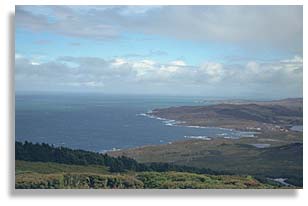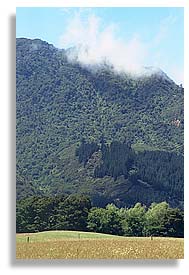|
The Wai 262 Claim by Six Maori Tribes
Flora and fauna and cultural and intellectual heritage rights Interview with Maui Solomon Wellington, Aotearoa / New Zealand
Maui Solomon is a Moriori Maori barrister, an indigenous lawyer from Aotearoa New Zealand. He represents a number of tribes in Aotearoa New Zealand, in particular his own Moriori iwi, or tribe, from the Chatham Islands, a little island 800 kilometers east of New Zealand. He also represents three tribes: Ngati Kuri, Ngati Wai and Te Rarawa (other counsel represent the remaining three) in relation to the Wai 262 flora and fauna and cultural and intellectual heritage rights claim that's currently being heard by the Waitangi Tribunal. The interview was conducted March 12 and 15, 2001 by phone (from San Diego, U.S.) by Nic Paget-Clarke. This interview is part of an extended series of articles and interviews gathered by In Motion Magazine in the context of the 2000-2001 hearings of New Zealand's Royal Commission on Genetic Modification. In Motion Magazine travelled around New Zealand with Missouri Rural Crisis Center and Natiional Family Farm Coalition president Bill Chrisitison visiting farmers and community leaders and listening to their views about genetically modified organisms. Currently there are no commercial GE crops in New Zealand. After hearing the recommendations of the commission the New Zealand government will make a decision on whether or not GE crops will be allowed in New Zealand. In Motion Magazine: What is the Wai 262 claim? Maui Solomon: The Wai 262 claim is a claim by six tribes throughout New Zealand (Ngati Kuri, Ngati Wai, Te Rarawa, Ngati Kahungunu, Ngati Porou and Ngati Koata) to the Waitangi Tribunal for recognition and protection of the cultural and intellectual heritage rights in relation to indigenous flora and fauna and their Matauranga, or traditional knowledge, customs and practices related to that flora and fauna. It includes all native species in New Zealand. It includes Maori arts and designs. It includes traditional knowledge, plants, medicines. It raises concerns in opposition to genetic tampering with the DNA structures of native flora and fauna in the sense that Maori have a particular whakapapa or genealogical relationship with the native flora and fauna that is not being respected or understood by science, and scientists, and the experiments that are taking place. The claimants look upon it as tampering with their whakapapa or their genealogical connections. So for example, Tane Mahuta is the god of the forest but he's also an ancestor of the claimants. He appears in their whakapapa. As does Tangaroa, the god of the sea. As does Tawhiri-matea the god of winds. They are the children of Papatuanku( the Earth mother) and Ranginui ( the Sky Father). Tane made the first human and as such they are all elders in the family tree, as it were. Tampering with the native korimiko, totara, kauri, the native trees within Tane-Mahuta's domain, is like tampering with the genes of one's own family member. Why should a scientist muddle around with the genes of a totara tree that Tane-mahuta created and try to make a better tree?. Or, before he does, there are certain considerations, ethical, moral, cultural and spiritual, that need to be taken into account.
It raises issues to do with the government's responsibility to Maori as the indigenous peoples of this country. The responsibility to protect their rights as guaranteed under the Treaty of Waitangi in 1840. The claim seeks protection for these rights, both legally and culturally. In Motion Magazine: Could you give some background on the Waitangi Tribunal? Maui Solomon: The Waitangi Tribunal is a quasi-judicial body that was established in New Zealand in 1975 and given the mandate to investigate claims by Maori under the Treaty of Waitangi as to whether or not and to what extent that the Crown or the New Zealand government, has honored the principles of the Treaty of Waitangi signed between chiefs and tribes and her Majesty Queen Victoria in 1840. That treaty stipulated in Article One that Kawanatanga or governance would pass to the Queen. In Article 2, it guaranteed to Maori the full, exclusive, and undisturbed possession of all their lands, forests, fisheries and all other treasured possessions for so long as they wished to retain the same in their possession. But, no sooner had the ink dried on the Treaty, than the Crown began to dishonor the terms and articles of the Treaty. It became buried by the courts and the politics of the day. Millions of acres of land were confiscated. Maori were displaced. Forests were chopped down to make way for sheep and cattle pasture. Maori were pushed off their land. Forcibly in many cases. At the point of a rifle. The Treaty was declared a " simple nullity" by the Chief Justice of New Zealand in 1877, saying that there was no corpus, or authority, recognized by international law that could have signed a treaty with the Queen of England. Maori lacked the status, if you like. That was according to the pakeha, the European view, of the Treaty. And yet the British Crown in 1835 and again in 1840 were prepared to acknowledge that Maori had sovereinty over Aotearoa/New Zealand because they knew they couldn't, at that time, take New Zealand by force...they were vastly outnumbered by the indigenous inhabitants. In effect, the Crown got what it wanted and to hell with Maori who rapidly became a minority in their own country as a result of colonization and the lands, forests and fisheries being made available to the migrant settlers, mainly from the U.K. At the moment, there are close to 900 claims that have been filed with the Waitangi Tribunal. In 1974, there was a major land march from the top of the North Island of New Zealand down to Wellington. The march was lead by a 70-80 year-old Maori kuia, elder. 10-20,000 people joined the march on its way down the island to parliament to protest against the continued sale of Maori land. That's when the Waitangi Tribunal was set up, in 1975. In 1985, it was given retrospective authority to consider claims going back to February 6, 1840, when the Treaty was signed.
The Wai 262 claim itself arose from a concern of two elder women in 1988 when they discovered that a number of native cultivars of the kumara, the native sweet potato of New Zealand, brought here by the Maori, had been deposited in a research institution in Japan. The kumara at that time was no longer available in New Zealand, so they made a pilgrimage to Japan to bring the kumara back to New Zealand. The kumara is not just a source of food. There are rituals and traditions associated with the kumara and its seasonal cycles. The original claim was originally prepared and filed in 1991 by Moana Jackson, Syd Jackson's brother (see interview with Sydney Jackson) on behalf of the 6 tribal claimant representatives.. These two elder women were Mrs. Del Wihongi, from Te Rarawa, and Mrs Saana from Ngati Kuri. They initiated the claim together with their friends and colleagues Mrs. Tama Poat from Ngati Porou, Witi McMath from Ngati Wai, John Hippolite from Ngati Koata, and Katherine Rimine from Ngati Kahungunu. They all filed this claim on behalf of their respective tribes. There are particular issues that are relevant for those particular tribes and also there are issues which cut right across the board in a generic sense that affect all Maori. We began the Wai 262 hearing in 1997 and we've completed the traditional evidence of the six tribes. But, it's been a very long process and one of the things that frustrates the claimants is the complete lack of funding that's been provided by the Crown. Although it's generally acknowledged by the Crown that this is one of the most important claims that's been brought in New Zealand to date, they aren't doing anything to assist the funding of it. The Crown, the government, has taxpayers' money to send along the policy advisors from the various government ministries -- conservation, commerce, foreign affairs, trade, etc to attend all the hearings. But, there's been no funding provided to the claimants for research or administration costs who have had to fund these costs from their own pockets often to their financial detriment. Given the widely acknowledged importance of the issues this claim raises for New Zealand and internationally, this attitude by the Crown demonstrates, in my view, a show of bad faith....especially when one considers that they funded their GE Commission to the tune of $4million and Wai 262 had raised these issues more than 10 years ago! In Motion Magazine: What is the Plant Varieties Act and how does it relate to the Wai 262 claim and genetic engineering? Maui Solomon: The Plant Varieties Act basically gives any person the ability to apply for a plant variety right over any plant, and any other plant that is a clone, hybrid, or cultivated variety of that plant. This doesn't include algae or fungus. The act gives them exclusive rights to sell the variety for commercial profit, to license the use of those plant variety rights. Potentially, it gives companies the right to acquire legal property rights, now regarded as proprietary rights under the act. It gives companies the right to acquire intellectual property over a clone of a native species of plant, or a hybrid of that plant. It allows companies to tinker with the genetic makeup of a plant, so that it qualifies as a variety that might have special commercial properties, and then obtain intellectual property rights over it. The objection from the Wai 262 claimants is that if it concerns any indigenous flora then the Maori perspective, cultural, ethical, spiritual perspective, needs to be taken into account. In Motion Magazine: Can you tell me about the case involving ERMA and the genetically engineered cows? Maui Solomon: There is a body in New Zealand, the Environmental Risk Management Authority, or ERMA, that's been set up specifically under the Hazardous Substances and New Organisms Act, 1993. The Act controls the introduction of genetically modified organisms. The role of ERMA is to consider any applications for genetically modified organisms. At the end of last year, ERMA had a hearing to consider an application to genetically modify cows and plant a human gene into a cow for an alleged scientific, medicinal reason. Maori objected to that. Ngati Wairere, a hapu from the Waikato area where these experiments are being carried out, filed a submission with ERMA, opposing it. The Maori advisory committee to ERMA recommended that the application be turned down until the Royal Commission on genetic modification had completed its inquiry. Ngati Wairere and the Wai 262 claimants suggested they put a moratorium on granting any applications for GMO's. But the authority went ahead and granted the application. The tribe appealed to the High Court and we are awaiting the decision on that now.The GMO issue is quite a significant one and Maori, because of their traditional role as kaitiaki, or guardian of the lands and the natural resources of this country, are at the vanguard of the opposition to genetic modification. Often that point isn't appreciated by the public here in New Zealand. Maori have great concerns about the environment and natural resources and the cultural and spiritual aspects associated with tampering with genetics of plants and animals. This issue was raised in the Wai 262 claim some ten years ago and yet, as I said before, the government, the Crown hasn't made any funding available to the claimants. But they have spent four or five million dollars on this Royal Commission of Inquiry. It seems to me unjust and hypocritical for them to do that for the Royal Commission on the one hand, but, on the other, refuse to fund Maori who raised the same concerns 10 years earlier. The New Zealand public could have been much better informed had the Wai 262 claim been completed. There are benefits not just for Maori. There are benefits for all New Zealanders. For example, Maori culture has tremedous value to the international branding of this country and its natural products ... but it must be done in a proper way and by Maori so the message is not lost or corrupted. In Motion Magazine: What is the name of this case? Maui Solomon: Ngati Wairere versus the Environmental Risk Management Authority. In Motion Magazine: You feel it is a very important case? Maui Solomon: It's a watershed case. In Motion Magazine: Why? Maui Solomon: Essentially, ERMA, which is a statutory body, completely ignored, in my estimation, failed to understand, the nature of Maori cultural objection to genetic modification. They said, your concerns are cultural and spiritual but when you compare them to scientific evidence they pale into nothingness. It was a denigration of the significance and importance of Maori cultural and spiritual beliefs. They have an obligation to take into account the Treaty of Waitangi and Maori cultural concerns. I was asked to provide some advice to the authority to help them better understand their Treaty obligations. I said to the chief executive, last year, when I met with them. "How can you take into account your statutory obligations, take into account Maori cultural values, when the members of the authority do not have the intellectual cultural ability to understand those values? Despite your best endeavors you can't understand them. What we are saying is that you need people with the right expertise on those authorities. Expertise in tikanga Maori, Maori cultural values and protocols. People who can understand what the submitters are saying. Not people who are hand-picked by the authority or by the Crown who are scientists who happen to be part-Maori but who may not have any understanding of those cultural issues at all. It would be a watershed in that it would be the first time that a court in New Zealand would have ruled on a decision of ERMA on matters effecting genetically modified organisms. It's a case that will start setting precedents as all legal cases do over a period of time. However, I'm not holding my breath the the courts will get it right either because of the essentially mono-cultural nature of our legal system ... a problem which plagues all indigenous peoples who are a minority in their own countries. In Motion Magazine: Was there a declaration of independence by Maori prior to the Treaty of Waitangi? Maui Solomon: There was a declaration of independence signed in 1835. The British had been here for about 75 years. The Declaration of Independence was signed by the northern chiefs. They declared their independent tribal sovereignty. They had their own flag, and they were trading with New South Wales under their flag. It's that entity that the British crown, Queen Victoria, recognized in 1840 as well as other chiefs and tribes who weren't under the Confederation. The Confederation of United Tribes, who signed the Treaty, entered into the declaration of independence in 1835 and then they, together with other chiefs and tribes, signed the Treaty of Waitangi in 1840. Maori still claim that the 1835 declaration has relevance in international law. It's not legally recognized as such in New Zealand, but there are different Maori groups including the modern day manifestation of the Confederation of United Tribes who are taking various legal maneuvers in the courts to have the Declaration recognized. In Motion Magazine: What is the Mataatua Declaration? Maui Solomon: The Mataatua Declaration was the first international indigenous people's declaration on protecting the intellectual and cultural property rights of indigenous peoples and it was hosted by the Mataatua tribes of the Bay of Plenty area in Aotearoa New Zealand. Over 200 organisations have signed the Mataatua Declaration. It's been submitted to the U.N. It's been submitted to the Convention on Biological Diversity. It was submitted in evidence to the Waitangi Tribunal. It hasn't formally been adopted in any legal sense but it acts as a benchmark and is a template for other similar initiatives in the future. It was signed here in New Zealand, in 1993, at Whakatane, up on the east coast. A second meeting of the Mataatua tribes is being planned for 2002. |
|||||||||||||||||||||||||||||||||||||||||||||
|
Published in In Motion Magazine April 22, 2001. Also see:
|
|||||||||||||||||||||||||||||||||||||||||||||
If you have any thoughts on this or would like to contribute to an ongoing discussion in the  What is New? || Affirmative Action || Art Changes || Autonomy: Chiapas - California || Community Images || Education Rights || E-mail, Opinions and Discussion || En español || Essays from Ireland || Global Eyes || Healthcare || Human Rights/Civil Rights || Piri Thomas || Photo of the Week || QA: Interviews || Region || Rural America || Search || Donate || To be notified of new articles || Survey || In Motion Magazine's Store || In Motion Magazine Staff || In Unity Book of Photos || Links Around The World || OneWorld / US || NPC Productions Copyright © 1995-2011 NPC Productions as a compilation. All Rights Reserved. |
|||||||||||||||||||||||||||||||||||||||||||||




